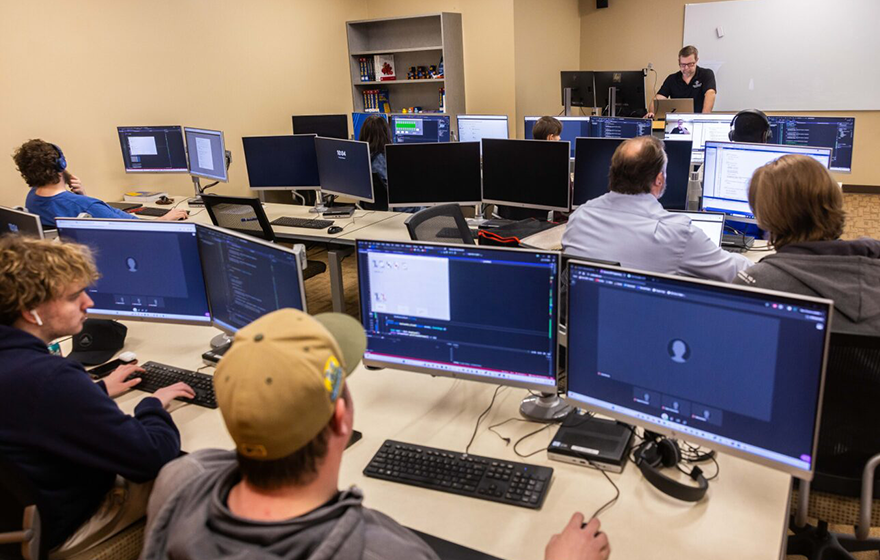Devoted Developers vs. In-House Teams: Which Is Right for You?
The choice between utilizing specialized developers and preserving an in-house team is a considerable one that can affect the trajectory of your projects and general company approach. Committed designers supply a degree of adaptability and specialized proficiency that can be beneficial for particular, short-term campaigns. Alternatively, in-house teams contribute to a natural company culture and a nuanced understanding of long-lasting objectives. By analyzing important aspects such as budget plan, job extent, and wanted control, you can much better identify which technique straightens with your business demands. Nonetheless, the implications of this choice prolong past prompt results-- think about the broader effect on your service landscape.
Recognizing Committed Developers
The growing demand for specialized abilities in the tech sector has resulted in the appearance of devoted designers as a feasible service for numerous companies. These professionals are commonly gotten on a task basis, permitting companies to utilize specific proficiency without the long-lasting dedication linked with permanent hires. Devoted designers are commonly embedded within a client's group, giving versatility and scalability to satisfy task needs.
This version allows organizations to access a worldwide skill swimming pool, which is specifically advantageous in a quickly evolving technical landscape. Dedicated programmers can be sourced from numerous geographical areas, ensuring that firms can discover the right capability at competitive prices. They commonly bring a wide range of experience and knowledge, having actually functioned on diverse jobs throughout different markets.
Furthermore, dedicated designers can focus specifically on the jobs at hand, enhancing efficiency and effectiveness. They are furnished to incorporate flawlessly right into existing operations, collaborating closely with in-house teams to achieve project objectives. This method not only decreases the concern of recruitment and training but also allows organizations to remain agile, adjusting quickly to changing market needs and technical innovations.
Benefits of In-House Teams

Additionally, in-house teams tend to have a deeper understanding of the firm's mission, worths, and goals. This positioning can enhance worker involvement and motivation, as staff member feel a lot more attached to their work and the company's success. In addition, having a devoted internal group permits much better placement of purposes and techniques, as these participants are consistently concentrated on the company's concerns.
Internal teams likewise facilitate quicker decision-making processes, as they can react extra rapidly to obstacles and changes. The well established partnerships and knowledge with company protocols permit structured process and minimized miscommunication. Inevitably, the mix of a natural society, placement with organizational goals, and efficient communication makes in-house teams an important possession for several companies, particularly those wanting to grow long-lasting development and technology.
Cost Considerations
When assessing expense factors to consider, both devoted designers and in-house teams existing distinctive economic implications for organizations. Engaging specialized programmers commonly involves a pay-per-project or hourly rate model, which can be cost-effective for businesses with fluctuating task demands. This method enables adaptability in scaling sources up or down, guaranteeing that companies just pay for the services they require.
In contrast, internal teams entail repaired costs, consisting of incomes, advantages, and overhead costs such as workplace and devices. While this model uses greater control and prompt accessibility of resources, it might lead to greater long-term expenditures, particularly if the work does not justify a permanent personnel.
Moreover, business need to think about the surprise costs connected with employment and training of internal staff members, which can further strain budget plans. In many cases, the moment and sources invested in managing an internal group can diminish the organization's core service purposes.

Task Monitoring and Adaptability
Task administration and flexibility are essential elements that affect the option in between in-house groups and dedicated programmers. Dedicated teams often have actually developed processes for handling projects efficiently, leveraging details approaches like Agile or Scrum, which promote iterative progression and adaptability.

Eventually, the choice in between specialized designers and in-house groups pivots on the preferred level of adaptability and the certain project monitoring needs. Companies must examine their operational characteristics, job intricacy, and resource availability to establish which choice aligns ideal with their tactical purposes.
Making the Right Option
Selecting the best advancement strategy-- in-house teams or find this specialized programmers-- calls for a careful assessment of various elements that line up with a business's calculated objectives. Alternatively, internal groups can offer much better continuity and integration with existing personnel.
Next, review your budget. Dedicated developers typically provide a cost-efficient remedy for temporary jobs, while internal teams may sustain greater long-lasting costs because of incomes, benefits, and expenses prices. Examine the degree of control and partnership desired; internal groups normally promote stronger interaction and placement with business culture.
If prompt results are essential, committed designers can be onboarded rapidly, whereas developing an internal team takes time for employment and training. If continual development is crucial, spending in an in-house group might yield much better returns over time.
Final Thought
In verdict, the choice in between in-house groups and dedicated developers hinges on project requirements and organizational objectives. Dedicated developers offer versatility and specific know-how, making them ideal for temporary efforts. On the other find hand, internal groups grow a cohesive society and deeper positioning with lasting objectives. Mindful analysis of spending plan restraints, job timelines, and preferred control levels is important for identifying the most ideal strategy, making certain positioning with tactical priorities and functional performance.
The decision between making use of specialized developers and keeping an in-house group is a substantial one that can affect the trajectory of your tasks and general business approach.Project monitoring and versatility are crucial variables that influence the selection between internal teams and committed developers. hire dedicated developers.In comparison, in-house teams might stand out in maintaining a consistent task monitoring structure due to their experience with the company's culture and long-lasting objectives. Devoted developers usually present a cost-efficient solution for short-term jobs, while internal groups might sustain greater long-term expenses due to incomes, advantages, and expenses prices.In conclusion, the decision between committed developers and in-house teams pivots on project requirements and organizational goals